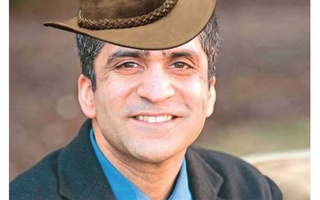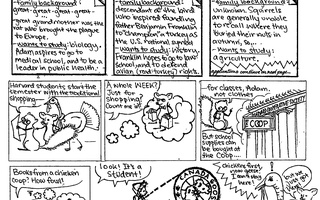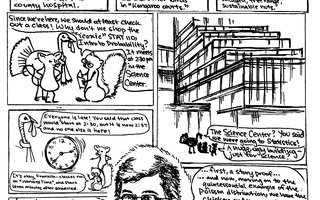About a week ago, 1,118 students from around the nation and the world received a coveted letter of acceptance from our very own Harvard College. Joining their Early Action peers, as many as 2,056 students will arrive in Cambridge next fall for the 381st year in this storied institution’s history.
At some point in the whirlwind of Opening Days, they will all gather together and sit shoulder to shoulder in Sanders Theatre―prep school alumni next to public school graduates, urban New Yorkers besides middle-of-nowhere Alaskans, students hailing from Boston, Bosnia, and everywhere in between. Dean of the College Rakesh Khurana will advise them to make the most of the wealth of opportunities that have just opened before them. As we’ve all heard again and again, he will tell them to seek out a “transformative experience” during their brief time here.
But for many, it’s not so simple. 15.1 percent of these students will be the first in their families to go to college. Roughly one fifth will have come from low-income families. Others will be among the first from their high school to attend such an institution.
For these students, the very first step onto a campus of such prevalent wealth, privilege, and entitlement represents a drastic change from their pre-college lives. Simply surviving is already incredibly challenging, but pursuing Dean Khurana’s “transformative experience” would require a level of support that, as evidenced by the recent rejection of a bridge program, the administration seems unwilling to commit to.
On his website, Khurana elaborates on his goal: “We want to ensure that we are providing students with a deeply transformative experience―intellectually, socially and personally―that will prepare them for a life of citizenship and leadership.” Yet, Khurana’s three realms of transformation―intellectual, social, and personal―are difficult to achieve given the additional obstacles faced by underprivileged students.
Harvard is academically rigorous for all, but a student’s high school can make a massive difference in their preparedness for this challenge. For example, students from public schools that offer few AP or advanced classes immediately find themselves behind prep school peers who are able to pursue upper-level classes in their first semester. This is just one of the many advantages that feeder schools give over students from high schools that didn’t expect them to go to college.
In terms of social transformation, the sudden exposure to the massive and highly-visible wealth that exists at Harvard creates tension. It is impossible to ignore the disparities that arise when 15.1 percent of the student body comes from the socioeconomic top 1 percent―families that make over $630,000 a year. Even when personalities are compatible, it can be difficult to feel a sense of similarity when one student’s Canada Goose jacket costs just as much as another’s entire wardrobe. These boundaries are reinforced by numerous social spaces on campus that, while more open today than ever before, are nevertheless built on a foundation of wealth, legacy, and social status.
Finally, various burdens make it difficult for students to focus on personal growth. Pressure to preserve high grade point averages in order to maintain any outside scholarships adds stress in an already intense environment. Even as attending Harvard creates new relationships, it can also produce serious feelings of separation from one’s home community. It’s easy to feel disassociated from a poor hometown and from unemployed high school peers as one begins to experience and observe previously unfathomable levels of privilege.
Most, if not all, of us question the legitimacy of our acceptance letter at some point. When 95 percent are declined, it’s natural to wonder what actually sets you apart. But at the same time, it’s necessary to acknowledge that for some students, these feelings of “not belonging” are rooted in reality―historical exclusion, structural boundaries, and educational disadvantages. And these worries are not unfounded: the Education Advisory Board reported that, nationally, as many as 90 percent of low-income, first-gen students do not graduate on time.
Harvard has made an incredible effort to accept students from a range of backgrounds, especially those who have had more challenging paths to this point―to abandon them once they arrive is hypocritical, irresponsible, and disrespectful. Without a doubt, Dean Khurana’s goal of giving students a transformative experience during their years in Cambridge is admirable. But the administration must acknowledge that some face additional obstacles. And while the College need not guarantee the result, it must ensure every student an equal opportunity. Because when even the first step feels too high, climbing to the top is impossible.
Ethan McCollister ’20 is a Crimson editorial editor living in Weld Hall. Augusta Uwamanzu-Nna ’20 lives in Canaday Hall.
Read more in Opinion
AEPi Was Right to Go Gender NeutralRecommended Articles
-
Reflections on National Coming Out DayThis is why we fight for transformation—because one of the great lessons of transformation is that the struggle of others is our struggle too.
-
Liberal Artifice: How the “Liberal Arts” Can Mean More Than a BuzzwordIn order to meaningfully enact an ethos rooted in the transformative power of the liberal arts, no amount of curriculum shifting can be adequate: Gen Eds need to play a more fundamental, intimate role in the Harvard experience.
-
 Kesh Him Outside: Khurana On His New Meme Fame
Kesh Him Outside: Khurana On His New Meme Fame -
 A Rat, a Turkey, and a Squirrel Walk into the Yard...
A Rat, a Turkey, and a Squirrel Walk into the Yard... -
 A Rat, a Turkey, and a Squirrel Walk into a Class...
A Rat, a Turkey, and a Squirrel Walk into a Class...













